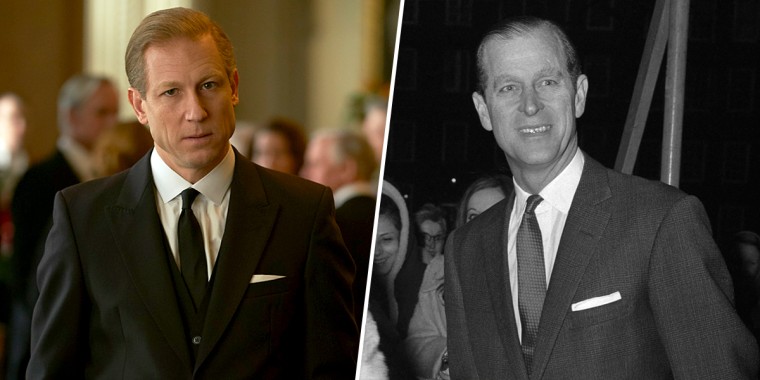Netflix's glossy royal family drama "The Crown," now in its third season, turns viewers into amateur historians. (Who among us has not scurried off to Google in the middle of an episode, itching for factoids about Welsh nationalism and Labour Party politics?) The acclaimed series takes ample liberties with the historical record, of course — but NBC News is here to help you separate fact from fiction. Be warned, though: spoilers ahead.
Let's move on to Prince Philip, the Duke of Edinburgh (Tobias Menzies), Queen Elizabeth II's husband of more than seven decades. The season's seventh episode, titled "Moondust," centers on a period in the late 1960s when the fictionalized version of Philip questions his purpose, wrestling with what might be described as a midlife crisis. Philip's personal difficulties appear to manifest themselves in an obsession with the Apollo 11 moon landing and the heroism of the astronauts who piloted the lunar module.
"In some ways, it's a continuation of themes in the first seasons: being second to his wife, sacrificing his own life and career, to some extent," Menzies told The New York Times in a recent interview. "But there is a further digging in to that, a sense of the road not traveled. I think we all have those thoughts."
But was the real-life Philip's self-reckoning really as intense? Let's investigate.
Did the Duke go through a middle-age slump?
"Moondust" finds the prince feeling adrift, directionless and spiritually inert. "There wasn't a specific moment when it started," Philip says in one poignant scene. "It's been more of a gradual thing: a drip, drip, drip of doubt, disaffection, disease, discomfort. ... [and] compulsive overexercising. An inability to find calm or satisfaction or fulfillment. And when you look at all these symptoms, of course it doesn't take a genius to tell you that they all suggest I'm slap bang in the middle of a — I can't even say what kind of crisis!"
Philip's confession is presented in the episode as a prelude to a renewed interest in his Christian faith. Nobody is immune to periods of personal anguish, on-screen and off, but the real-life Philip was not nearly as rudderless in his late 40s and early 50s, according to Sally Bedell Smith, a royals historian and author of "Elizabeth the Queen: The Life of a Modern Monarch."
"I believe it is complete invention," Smith said in a recent phone interview. "I don't think he would've known a midlife crisis if it slapped him in the face. He has always been secure and confident, and he has always understood what his role was vis-à-vis the Queen."
Smith added that the real-life Philip has never been for lack of hobbies and activities, from medical advances to mentoring young people partly through the Duke of Edinburgh's Award program. What's more, according to a New York Times article from Nov. 8, 1969, Philip was active in the burgeoning movement against environmental pollution in Great Britain. "It was a really impressive portfolio," she said, adding that the prince remained busy up until his retirement from public duties in 2017, when he was 96.
Was he obsessed with the 1969 moon landing?
The episode portrays Philip as a man riveted by the Apollo 11 moon landing of July 20, 1969. He becomes captivated by the technological resourcefulness and old-fashioned bravery of the astronauts themselves, whom he says are "too busy achieving something spectacular" to get bogged down in petty earthbound concerns. (In a dryly comic scene, Philip meets his moon-walking idols and realizes they are three normal guys from America.)
"Moonstruck" nails certain details about the epochal moment: Elizabeth II (Olivia Colman) really did send a short message to the moon via a tiny disc, and the royal family proudly hosted the astronauts — Neil Armstrong, Buzz Aldrin and Michael Collins — at Buckingham Palace in October 1969. It also makes sense that Philip was drawn to the Apollo 11 mission given his well-documented passion for science, technology, world exploration and adventurism, including visits to Papua New Guinea and the Antarctic that were depicted in the second season of "The Crown."
But it would be a stretch to suggest that the self-possessed Duke of Edinburgh was single-minded in his fixation on Apollo 11, or that a midlife crisis grew out of a sense of perceived inferiority, according to Smith. "The idea that he was obsessed with them and had a midlife crisis over not being on the Moon is really preposterous," she said. "He wouldn't have been sitting around brooding about not being an astronaut."

